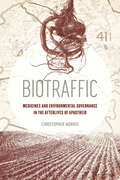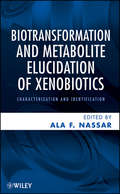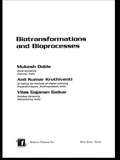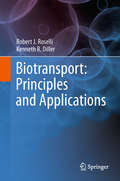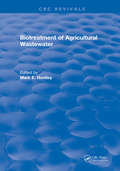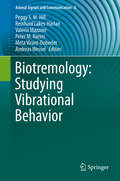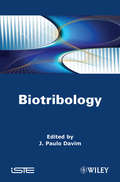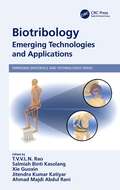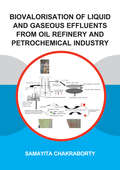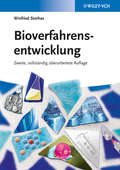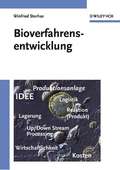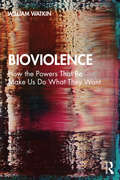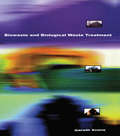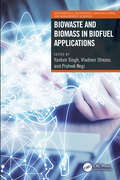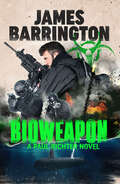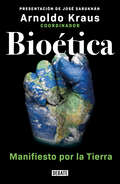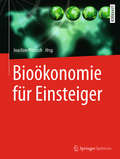- Table View
- List View
Biotoxins: Biotechnological and Therapeutic Applications
by Majeti Narasimha Vara Prasad Sarada Devi Tetali Catherine Bennetau-PelisseroThis book covers biologically produced toxins, their chemistry, mode of action, and potential therapeutic applications. In the first part of the book, readers are introduced to the fundamental chemistry of biotoxins, their mechanisms of action, and possible antidotes, paving the way for a deeper understanding of their therapeutic potential. Subsequent chapters outline different types of biotoxins and their impact on food quality and safety, and their potential applications in agriculture and medicine. Particular attention is given to terrestrial and aquatic phytotoxins, bioactive metabolites produced by microorganisms and plants, mycotoxins, phycotoxins, cyanotoxins, neurotoxins of natural origin, bacterial toxins, insect toxins and marine toxins. An authoritative perspective on topics like bioterrorism and the military potential of biological toxins is also offered in this book. The second part of the book presents an overview of cutting-edge detection techniques to identify emerging biotoxins in several matrices. Readers will find an authoritative overview of the recent developments in nanotechnology and microfluidics (nanomaterial-based systems), and biosensors (immunosensors, receptor-based biosensors, and cell-based biosensors). The book also covers other detection techniques applied to food such as fluorescent, colourimetric, electrochemical, photoelectrochemical, and electrochemiluminescent techniques. Given its breadth, the book appeals to researchers, academics, and students interested in biotoxins, their pharmacological importance and their impact on agriculture and human health.
Biotraffic: Medicines and Environmental Governance in the Afterlives of Apartheid
by Christopher MorrisBiotraffic explores the complex world of biological resource trade. It takes readers inside the contemporary Ciskei region of South Africa, a once-notorious apartheid "homeland" turned extractive hub for wild medicinal plants. Drawing from in-depth ethnographic and archival research, Christopher Morris examines the region’s trade in Pelargonium sidoides, a plant once contested as a tuberculosis treatment in early twentieth-century Europe and now an internationally marketed remedy for the common cold. The story of this trade links past and present, encapsulating a larger tale about colonial legacies and their intersection with global environmental governance ambitions. It also teems with a diverse cast of actors, from plant harvesters and pharmaceutical companies to activist NGOs and the chiefs who have become business partners with multinational drug firms. The book’s analysis extends beyond considering merely the extraction and commercialization of plant resources and offers a critical examination of how demand for therapeutics intertwines with broader struggles over land and political power in South Africa. Biotraffic illuminates how a distance-defying trade is reshaping the sociopolitical landscape of a region—a region grappling with apartheid's afterlives and the challenges of environmental and economic justice.
Biotransformation and Metabolite Elucidation of Xenobiotics
by Ala F. NassarThe goal of this book is to improve the readers' knowledge of metabolite elucidation in drug metabolism by exposing them to in depth coverage of the biotransformation of xenobiotics, strategies for identifying and characterizing metabolites, FDA guidelines, and case studies on how to improve the decision-making process in structural modification of drug candidates to reduce toxicity.The book consists of 8 chapters; it first provides an introduction on biotransformation of xenobiotics, and then presents modern approaches and strategies for dealing with metabolite characterization, using tools such as LC-MS, H-D exchange, stable isotopes LC-MS-NMR, and radiolabeled compounds. Also, strategies for dealing with reactive intermediates in drug discovery and development are presented as well as case studies on improving the decision-making process in the structural modification of drug candidates. The last chapter discusses the regulatory perspectives of safety testing of drug metabolites and why, how, and when to test their safety.
Biotransformation of Waste Biomass into High Value Biochemicals
by Satinder Kaur Brar Gurpreet Singh Dhillon Carlos Ricardo SoccolAgro-industrial wastes are end-products emerging after industrial processing operations and also from their treatment and disposal e. g. solid fruit wastes and sludge. The agro-industrial wastes are often present in multiphase and comprise multicomponent. Nevertheless, these wastes are a goldmine as they possess valuable organic matter which can be diverted towards high value products ranging from polymers to antibiotics to platform chemicals. There have been plenty of books published on bioenergy, enzymes and organic acids, among others. However, this emerging field of biochemical has not yet been covered so far which is an important entity of the biorefinery model from waste biomass and needs to be understood from fundamental, applied as well as commercial perspective which has been laid out in this book.
Biotransformations and Bioprocesses (Biotechnology And Bioprocessing Ser. #Vol. 28)
by Mukesh Doble Anil Kumar Kruthiventi Vilas Gajanan GaikarFrom the laboratory to full-scale commercial production, this reference provides a clear and in-depth analysis of bioreactor design and operation and encompasses critical aspects of the biocatalytic manufacturing process. It clarifies principles in reaction and biochemical engineering, synthetic and biotransformation chemistry, and biocell and enzy
Biotransformations in Organic Chemistry: A Textbook
by Kurt FaberThe use of natural catalysts - enzymes - for the transformation of non-natural is not at all new: they have been used for more man-made organic compounds than one hundred years, employed either as whole cells, cell organelles or isolated enzymes [1]. Certainly, the object of most of the early research was totally different from that of the present day. Thus the elucidation of biochemical pathways and enzyme mechanisms was in the foreground of the reasearch some decades ago. It was mainly during the 1980s that the enormous potential of applying natural catalysts to transform non-natural organic compounds was recognized. What started as a trend in the late 1970s could almost be called a fashion in synthetic organic chemistry in the 1990s. Although the early euphoria during the 'gold rush' in this field seems to have eased somewhat, there is still no limit to be seen for the future development of such methods. As a result of this extensive, recent research, there have been an estimated 5000 papers published on the subject [2]. To collate these data as a kind of 'super-review' would clearly be an impossible task and, furthermore, such a hypothetical book would be unpalatable for the non-expert.
Biotransformations in Organic Chemistry: A Textbook
by Kurt FaberThe use of biocatalysts, employed either as isolated enzymes or whole microbial cells, offers a remarkable arsenal of highly selective transformations for state-of-the-art synthetic organic chemistry. Over the last two decades, this methodology has become an indispensable tool for asymmetric synthesis, not only at the academic level, but also on an industrial scale. This well-established textbook on biocatalysis provides a basis for undergraduate and graduate courses in modern organic chemistry, as well as a condensed introduction into this field. After a basic introduction into the use of biocatalysts--principles of stereoselective transformations, enzyme properties and kinetics--the different types of reactions are explained according to the 'reaction principle', such as hydrolysis, reduction, oxidation, C-C bond formation, etc. Special techniques, such as the use of enzymes in organic solvents, immobilization techniques and modified or artificial enzymes, are treated in a separate section. A final chapter deals with thebasic rules for the safe and practical handling of biocatalysts. In this completely revised 6th edition, emphasis has been given to an improved didactic style including colored graphics in order to facilitate a deeper understanding of the underlying principles. New developments, such as transamination, enzyme promiscuity and applications on industrial scale within the field of 'white biotechnology' are included.
Biotransport: Principles And Applications
by Robert J. Roselli Kenneth R. DillerIntroduction to Biotransport Principles is a concise text covering the fundamentals of biotransport, including biological applications of: fluid, heat, and mass transport.
Biotreatment of Agricultural Wastewater
by Mark E. HuntleyBiotreatment of Agricultural Wastewater is based on a symposium held in Lake Arrowhead, California in 1986, supported by a coalition of federal, state, and local agencies, and sponsored by the engineering firm of Swanson/Oswald Associates (Lafayette, California) and the research and development firms of Aquasearch, Inc. and EcoTechnology Corp. (La Jolla, California).This book is a synopsis of topics covered by world renowned experts on the biology and aquaculture of algae and bacteria and on the engineering of industrial scale systems for biological wastewater treatment and economists that were gathered to evaluate historically proven systems and develop new and innovative approaches to the biological treatment of agriculture wastewater.
Biotremology: Physiology, Ecology, and Evolution (Animal Signals and Communication #8)
by Andreas Wessel Peggy S. M. Hill Valerio Mazzoni Meta Virant-Doberlet Nataša Stritih-PeljhanBiotremology is a new and emerging discipline in biological sciences that covers all aspects of behavior associated with substrate-borne mechanical waves. This volume provides state-of-the-art reviews and technical contributions from leading experts and invited younger researchers on topics from signal production and transmission to perception in its ecological context. Reviews about the knowledge of well-studied groups are complemented with perspectives on the study of less-explored groups or contexts. Special attention is given to practical issues in measuring substrate-borne vibrations as well as to applied biotremology. The book appeals to all those interested in communication and vibrational behavior.
Biotremology: Studying Vibrational Behavior (Animal Signals and Communication #6)
by Andreas Wessel Peggy S. M. Hill Reinhard Lakes-Harlan Valerio Mazzoni Peter M. Narins Meta Virant-DoberletThis volume is a self-contained companion piece to Studying Vibrational Communication, published in 2014 within the same series. The field has expanded considerably since then, and has even acquired a name of its own: biotremology. In this context, the book reports on new concepts in this fascinating discipline, and features chapters on state-of-the art methods for studying behavior tied to substrate-borne vibrations, as well as an entire section on applied biotremology. Also included are a historical contribution by pioneers in the field and several chapters reviewing the advances that have been made regarding specific animal taxa. Other new topics covered are vibrational communication in vertebrates, multimodal communication, and biotremology in the classroom, as well as in art and music. Given its scope, the book will appeal to all those interested in communication and vibrational behavior, but also to those seeking to learn about an ancient mode of communication.
Biotribology
by J. Paulo DavimTribology is the “science and technology of interacting surfaces in relative motion” and encompasses the study of friction, wear and lubrication. By extension biotribology is usually defined as the tribological phenomena occurring in either the human body or in animals. Therefore, it is possible to consider tribological processes that may occur after implantation of an artificial device in the human body and the tribological processes naturally occurring in or on the tissues and organ of animals. Animals, including humans, possess a wide variety of sliding and frictional interfaces. The authors aim to provide some advances in research in biotribology. They cover several aspects of biotribology such as tribology of synovial joints and artificial replacements; wear of screws and plates in bone fractures repair; wear of denture and restorative materials; friction of the skin and comfort of clothing; wear of replacement heart valves; tribology of contact lenses and ocular tribology; biotribology on the microscale and nanoscale levels, etc. This book can be used as a research text for final undergraduate engineering courses (for example, materials, biomedical, etc.) or for those studying the subject of biotribology at the postgraduate level. It can also serve as a useful reference for academics, biomechanical researchers, biologists, chemists, physicists, biomedicals and materials engineers, and other professionals in related engineering, medicine and biomedical industries.
Biotribology: Emerging Technologies and Applications (Emerging Materials and Technologies)
by Jitendra Kumar Katiyar Salmiah Binti Kasolang T.V.V.L.N. Rao Ahmad Majdi Abdul Rani Xie GuoxinBiotribology includes tribological phenomena of natural and implant surface interactions under relative motion in the human body. Biotribology: Emerging Technologies and Applications disseminates ideas and research trends in biotribology and presents pioneering recent research advances impacting the field, focusing on the roles of mathematics, chemistry, physics, materials, and mechanical engineering. Discusses lubrication of joint replacements, computational modeling of biotribology and multibody biomechanical models Describes metal-organic frameworks, medical friction pairs, and electrochemical techniques to tribocorrosion tests Covers state of the art and future technological developments and applications, as well as challenges and opportunities Biotribology is an important and growing field, and the topics covered in this book will be of great interest to the international tribology community, appealing to readers working in the fields of materials science, biomedical engineering, biotechnology, mechanical engineering, and related areas.
Biovail Corporation: Revenue Recognition and FOB Sales Accounting
by Craig J ChapmanBiovail Corporation, a major Canadian pharmaceutical company listed on the New York Stock Exchange, announces that it will miss its quarterly earnings target by $25 to $45 million, blaming $10 to $15 million of the shortfall on a truck accident involving a shipment that left its facility on the last day of the quarter. The case was ultimately prosecuted by the U.S. Securities and Exchange Commission (SEC). The case is centered on the question of revenue recognition and how the company should have accounted for the sales (FOB company or FOB destination). However, it also provides a rich setting permitting exploration of peripheral topics around the ethics of earnings management. For example, the case discusses stock analysts' reactions to the announcement; questions how much product was actually in the truck; questions how aggressively the company responds against the analysts who downgrade the stock; and highlights the role of the SEC in enforcement.
Biovail Corporation: Revenue Recognition and FOB Sales Accounting
by Craig J ChapmanBiovail Corporation, a major Canadian pharmaceutical company listed on the New York Stock Exchange, announces that it will miss its quarterly earnings target by $25 to $45 million, blaming $10 to $15 million of the shortfall on a truck accident involving a shipment that left its facility on the last day of the quarter. The case was ultimately prosecuted by the U.S. Securities and Exchange Commission (SEC). The case is centered on the question of revenue recognition and how the company should have accounted for the sales (FOB company or FOB destination). However, it also provides a rich setting permitting exploration of peripheral topics around the ethics of earnings management. For example, the case discusses stock analysts' reactions to the announcement; questions how much product was actually in the truck; questions how aggressively the company responds against the analysts who downgrade the stock; and highlights the role of the SEC in enforcement.
Biovalorisation of Liquid and Gaseous Effluents of Oil Refinery and Petrochemical Industry (IHE Delft PhD Thesis Series)
by Samayita ChakrabortyA bidirectional approach of detoxifying the liquid and gaseous effluents of oil refineries is elucidated in this thesis. Liquid effluents of oil refineries contain selenium oxyanions and phenol, while gaseous effluents contain CO/syngas. To remove the phenol and simultaneously reduce the selenite oxyanions, a fungal-bacterial co-culture of Phanerochaete chrysosporium and Delftia lacustris was developed. Two modes of co-cultures of the fungus and the bacterium were developed. Both cultures were investigated for phenol degradation and selenite reduction. In order to valorize the CO/syngas by bioconversion techniques. an anaerobic methanogenic sludge was acclimatized to use CO as the sole carbon substrate to produce acetic acid, butyric acid, and hexanoic acid. Later, the acids were metabolized at lower pH, producing alcohols ethanol, butanol and hexanol, confirming the successful enrichment strategy. The next experiment focused on the absence of the trace element tungsten, and consecutively selenium on the previously CO acclimatized sludge under the same operating conditions. An in-situ synthesized co-polymeric gel of N-ter-butyl-acrylamide and acrylic acid was used to recover ethanol, propanol and butanol from a synthetic fermentation broth. The scope of repeated use of the gel for alcohol recovery was investigated and 98% alcohol was recovered.
Bioverfahrensentwicklung: Praxisbeispiele Für Auslegung, Betrieb Und Kostenanalyse
by Winfried StorhasZukunft sichern durch Nachhaltigkeit? Bioverfahrenstechnik bedeutet einen wichtigen Schritt auf dem Weg dorthin. Sie ersetzt klassische chemische Syntheseverfahren durch nachhaltige biologische Verfahren und vereint unterschiedliche Gebiete aus dem naturwissenschaftlichen und ingenieurtechnischen Bereich. Mit diesem Buch wird allen, die an der Entwicklung biotechnologischer Prozesse beteiligt sind, ein Werk an die Hand gegeben, das die einzelnen Aspekte der Bioverfahrensentwicklung darstellt und zu einem Gesamtbild zusammenfugt: Mikrobiologie, Molekularbiologie, Zellbiologie und Biochemie sowie die ingenieurtechnischen Bereiche Elektrotechnik, Informatik, Steuerungstechnik, Maschinenbau und Verfahrenstechnik - jeweils aus dem Blickwinkel der Verfahrensentwicklung betrachtet. Mit klaren, praxisorientierten Verfahrensbeispielen werden die beschriebenen Prozesse erklart. Im Vordergrund stehen dabei Verfahren, die in der Industrie eine wichtige Rolle spielen. Wirtschaftlichkeitsbetrachtungen, die bei der Entwicklung eines Verfahrens schon im Anfangsstadium eine entscheidende Rolle spielen, ist ein ganzes Kapitel gewidmet. Die zweite Auflage des Erfolgstitels von 2003 ist ein Muss fur alle Studenten der Biotechnologie und Verfahrenstechnik und das ideale Nachschlagewerk fur Ingenieure der Verfahrenstechnik, Biochemiker und Pharmazeuten. Stimmen zur 1. Auflage: 'Das Buch ist ein nutzlicher Begleiter in der taglichen Praxis und kann sowohl als Lehrbuch wie auch als Nachschlagewerk verwendet werden.' BIO WORLD, Dr. C. Andretta 'Dieses Buch richtet sich an alle, die einen Beitrag zur Entwicklung eines biotechnologischen Prozesses leisten mochten. Es informiert sehr ausfuhrlich uber die Bioverfahrensentwicklung und ermoglicht, sich ein Gesamtbild zu verschaffen. Es ist auch als Lehrbuch fur das Gebiet Bioverfahrenstechnik gut geeignet.' F & S (Filtrieren und Separieren)
Bioverfahrensentwicklung: Praxisbeispiele Für Auslegung, Betrieb Und Kostenanalyse
by Winfried StorhasBioverfahren haben sich in vielen Bereichen als überlegene Alternativen zu klassischen Produktionsverfahren etabliert, und ihre Bandbreite wird immer größer. Die Biotechnologie, insbesondere unter Einbezug der Gentechnik, hat zweifellos Zukunft. Die schnelle und effiziente Umsetzung von Forschungsergebnissen in wirtschaftliche Anwendungen birgt ein enormes wirtschaftliches Potential - und kaum eine andere Branche wächst derzeit so schnell wie die Biotechnologie. Wo sonst gibt es so viele Firmenneugründungen? Doch wie schafft man es, sich schnell zu orientieren? Das vorliegende Buch gibt einen Überblick über die systematische Entwicklung von Bioverfahren. Einer Zusammenstellung der unterschiedlichen Varianten der einzelnen Verfahrensschritte folgen die Beschreibung integrierter Gesamtprozesse, Wirtschaftlichkeitsbetrachtungen und Verfahrensbeispiele. Im Vordergrund stehen dabei Verfahren, die bereits eine wichtige Rolle in der Industrie spielen. Biotechnologie bedeutet Zukunftstechnologie!
Bioviolence: How the Powers That Be Make Us Do What They Want
by William WatkinAylan, Isis, Begum, Grenfell, Trump. Harambe, Guantanamo, Syria, Brexit, Johnson. COVID, migrants, trolling, George Floyd, Trump! Gazing over the fractured, contested territories of the current global situation, Watkin finds that all these diverse happenings have one element in common. They occur when biopolitical states, in trying to manage and protect the life rights of their citizens, habitually end up committing acts of coercion or disregard against the very people they have promised to protect. When states tasked with making us live find themselves letting us die, then they are practitioners of a particular kind of force that Watkin calls bioviolence. This book explores and exposes the many aspects of contemporary biopower and bioviolence: neglect, exclusion, surveillance, regulation, encampment, trolling, fake news, terrorism and war. As it does so, it demonstrates that the very term ‘violence’ is a discursive construct, an effect of language, made real by our behaviours, embodied by our institutions and disseminated by our technologies. In short, bioviolence is how the contemporary powers that be make us do what they want. Resolutely interdisciplinary, this book is suitable for all scholars, students and general readers in the fields of IR, political theory, philosophy, the humanities, sociology and journalism.
Biowaste and Biological Waste Treatment
by Gareth EvansWith growing public pressure and increasingly stringent environmental legislation, the waste industry is now being called upon to develop more sustainable methods of dealing with refuse. Coupled with moves to reduce reliance on landfill as a disposal route, biological treatment will increasingly become adopted as a standard requirement for the vast majority of putrescible wastes. Biowaste and Biological Waste Treatment examines the present, and likely future, state of biological waste treatment. The book falls naturally into three parts. The first covers the nature of biowaste, waste treatment in general and the regulatory framework which governs it. The second looks at the technologies and approaches available, while the final part examines the various policy questions and local, social and economic factors which affect the implementation of biowaste initiatives.
Biowaste and Biomass in Biofuel Applications (Mathematical Engineering, Manufacturing, and Management Sciences)
by Vladimir Strezov Yashvir Singh Prateek NegiThis book reflects the new dimension of biofuel production from its introductory principles to the advancements from a future prospective. It summarizes the rationale for changes in liquid fuel utilization and the selection of new technologies to make biofuel cost-effective and move toward a carbon-neutral approach. It provides an evidence-based outline of how additives and nanotechnology chemically change biofuels' quality and effectiveness, including new and innovative approaches, such as nanomaterials and various nano-additives. Features: It provides an overview of biowaste as a sustainable source in the field of biofuel production It includes effective conversion parameters of the biowaste feedstocks and their classification It summarizes current research into the development and exploitation of new biofuel sources It discusses the improvement of pilot scale scalability, chemical processing, and design flow It presents relevant and realistic global explanations of biowaste management techniques for biofuels This book is aimed at senior undergraduate and graduate students, and researchers in bioprocessing, chemical engineering, and biotechnology.
Biowatch and Public Health Surveillance: Evaluating Systems for the Early Detection of Biological Threats - Abbreviated Version
by Institute of Medicine National Research Council of the National AcademiesFollowing the attacks of September 11, 2001 and the anthrax letters, the ability to detect biological threats as quickly as possible became a top priority. In 2003 the Department of Homeland Security (DHS) introduced the BioWatch program--a federal monitoring system intended to speed detection of specific biological agents that could be released in aerosolized form during a biological attack. The present volume evaluates the costs and merits of both the current BioWatch program and the plans for a new generation of BioWatch devices. BioWatch and Public Health Surveillance also examines infectious disease surveillance through hospitals and public health agencies in the United States, and considers whether BioWatch and traditional infectious disease surveillance are redundant or complementary.
Bioweapon: A Paul Richter Novel (An Agent Paul Richter Thriller)
by James BarringtonA death that doesn’t make sense. A forgotten experiment. The world’s most devastating weapon.A weapons scientist in Cambridge is found dead under suspicious circumstances. Then a researcher at military science centre Porton Down goes missing.Paul Richter is on assignment in Amsterdam, chasing a lead from the GRU. What he finds is deeply worrying. Old weapons research is being unearthed, and powerful people blackmailed to keep the truth behind the two incidents hidden.As events spiral out of control, leading to an epic culmination on the Red Sea, Richter must battle against time to unravel this sinister plot, or face the full, unimaginable consequences...From bestselling author James Barrington comes the next scintillating installment in the Paul Richter thriller series, perfect for fans of James Deegan, Chris Ryan and Andy McNab.
Bioética: Manifiesto por la Tierra
by Arnoldo KrausA 50 años de la publicación de Bioethics, nuevas voces se suman al discurso en pro de nuestro planeta. Saúl Alcántara Onofre • Ana Barahona • Mauricio Beuchot Rolando Cordera Campos • Sergio García Ramírez Ángeles González Gamio • Arnoldo Kraus Eduardo Matos Moctezuma • Silvia Molina Herminia Pasantes • Jacqueline Peschard José Sarukhán • Fernando Serrano Migallón • Sergio Vela «En 2021 se cumplieron 50 años de la publicación de Bioethics: Bridge to the Future, texto indispensable cuando se cavila acerca de la salud de nuestra casa, la Tierra. Van Rensselaer Potter -1911-2001-, bioquímico estadounidense, profesor de Oncología en la Universidad de Wisconsin-Madison, retomó el término bioética, acuñado previamente por Fritz Jahr, cuyo propósito fundamental consiste en sumar las voces de humanistas y científicos a favor de la Tierra. [ Cincuenta años después de la publicación de Bioethics: Bridge to the Future, la salud de la Tierra ha empeorado.Cada día la prensa informa sobre nuevos desastres ecológicos. Día tras día científicos y humanistas advierten sobre los peligros latentes debidos al uso irracional de la tecnología sobre la Tierra, y subrayan que de no modificarse elpapel depredador del ser humano en el corto plazo la humanidad entera corre peligro. Las voces aquí reunidas, intranquilas por la continuidad de nuestra especie, celebramos la lúcida iniciativa de Potter e instamos a la sociedad para contagiar la idea seminal de la bioética, cuyo leitmotiv se encuadra en la palabra supervivencia. Convencer a políticos y empresarios de sus acciones nocivas es función de la sociedad. De no modificarse el rumbo depredador contra la naturaleza, el futuro y el de nuestros descendientes se encuentra amenazado.>> -Arnoldo Kraus
Bioökonomie für Einsteiger
by Stephan Meyer Joachim Pietzsch Wolfgang Zettlmeier Ulrich SchurrDieses Buch bietet eine aktuelle und gut lesbare Einführung in die Bioökonomie. Es vermittelt damit grundlegende Kenntnisse zum Verständnis eines Transformationsprozesses, der das 21. Jahrhundert prägen wird und die Integration vieler Disziplinen und Branchen verlangt, die bisher wenig miteinander zu tun hatten. Die Rede ist von dem allmählichen und notwendigen Übergang aus dem Zeitalter fossiler Brennstoffe, das vor rund 200 Jahren begann, in eine weltweite Wirtschaftsform, die auf nachwachsenden Rohstoffen (und erneuerbaren Energien) basiert. Dieses Buch begreift die Verwirklichung von Bioökonomie(n) dabei als eine dreifache Herausforderung – eine naturwissenschaftliche, eine ökonomische und eine ökologische. Woher stammt die Biomasse, die wir vorrangig für die Ernährung der wachsenden Weltbevölkerung wie auch für eine zukünftige energetische und stoffliche Nutzung brauchen? Wie wird sie in Bioraffinerien verarbeitet und welche Rolle kommt der Biotechnologie zu? Welche Gesichtspunkte der Innovationsökonomie gilt es zu bedenken, welche betriebswirtschaftlichen Aspekte der Wertschöpfung, Wettbewerbsfähigkeit und Kundenakzeptanz sind von Bedeutung? Welche Bedingungen muss die Bioökonomie erfüllen, um eine nachhaltige Entwicklung der Erde zu ermöglichen? Darf sie überhaupt auf Wachstumsziele setzen oder sollte sie sich nicht besser am Ideal der Suffizienz orientieren? Indem das Buch diese Fragen aus den nicht widerspruchsfreien Perspektiven ausgewiesener Experten behandelt, gibt es einen interdisziplinären Überblick über ein dynamisches Feld von Forschung und Praxis, der mehr Fragen aufwirft als beantwortet und dennoch eine Lücke schließt. Denn bisher gibt es keine verständliche und fachübergreifende Darstellung der Bioökonomie. Das macht die Lektüre dieses Buches zu einem Gewinn nicht nur für Einsteiger, sondern auch für Fachleute, die über die Grenzen ihres eigenen Fachgebietes hinausschauen wollen.

